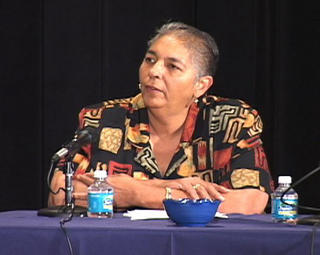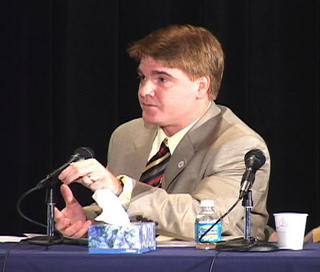Mayor Pro Tem Yvonne Johnson, a Greensboro native and graduate of Dudley High School and Bennett College for Women. In addition to an undergraduate degree in psychology, Johnson has a masters degree in guidance and counseling from N.C. A&T State University. She is director of One Step Further, Inc. mediation services and was the founder of Summit House. The recipient of numerous awards and honors, Johnson also is president of Bennett's Board of Trustees.
"I believe in the power of reconciliation as a real possibility."
"When I heard what had happened [on Nov. 3, 1979], my heart sank to one of its lowest and saddest levels it's ever been."
"Katrina has reminded us that race and poverty are still factors that must be addressed when we seek solutions to the problems and challenges that we face in this country today. The problem of the economic situation of blue-collar workers was a concern in 1979, and it is a major concern in 2005, and we need to work together to solve it once and for all. It seems that the more things change, the more they stay the same."
 "There are many things today that are better than it was in 1979. More people of color are being elected to public office. There are more people of color in corporate America and in various businesses and industry, etcetera. There are more department heads working for our city of Greensboro. And while I am delighted about all the positive changes and the inclusiveness, I need to let you know that a few weeks ago, I attended the State of the Piedmont, which was held at the Airport Marriott, where Winston-Salem, High Point, and Greensboro come together, sharing the state of this area. The only people of color on the program from any of those cities was Malachi House, and they sang the national anthem."
"There are many things today that are better than it was in 1979. More people of color are being elected to public office. There are more people of color in corporate America and in various businesses and industry, etcetera. There are more department heads working for our city of Greensboro. And while I am delighted about all the positive changes and the inclusiveness, I need to let you know that a few weeks ago, I attended the State of the Piedmont, which was held at the Airport Marriott, where Winston-Salem, High Point, and Greensboro come together, sharing the state of this area. The only people of color on the program from any of those cities was Malachi House, and they sang the national anthem.""The City of Greensboro has to show real leadership in bringing people together where there are very uncomfortable, very diverse views."
"I think that if you're going to put yourself out to be an elected official, a servant of the people, you need to be right, in terms of how you look at people and your level of caring for all people. And I think when you don't do that, when you do it for whatever other reasons you do it, you really the miss the boat on being a catalyst for chipping away and undoing racism."
"Maybe this process will allow our whole city to be transformed based on hope, our collective wisdom, and a spirit of cooperation, trust, and based on love."
---------------
Jeff Thigpen, a member of the Guilford County Board of Commissioners from 1998 to 2004 and currently an elected official serving as the Guilford County Register of Deeds. In the 1990s, Thigpen was a coordinator of the Business/Pulpit Forum Work Group, which was actively involved in bringing diverse groups together to get clarity and help resolve issues surrounding the Kmart Boycott. He has an undergraduate degree from Guilford College and a masters degree from UNC-Greensboro.
"I come here to you today as a leader that comes to acknowledge, and not to fear, that the future we want to build every day in Greensboro is being built upon the past. And we have a common responsibility - you, and I, the people in this audience, the people in this city - to understand that history and to use that history to help guide us as we move forward together."
"...and the fact that five people died that day, we have an obligation to look at it, honestly, as a city, and really find out what we can learn from it."
"88 seconds didn't happen in a vacuum."
"Jim Melvin's a member of our community. Rev. Nelson Johnson is a member of our community. Political leaders are members of our community, and so is the media. We are all learning individuals; we are all learning institutions."
 "There's so much opportunity to do some investigative work, and it's not being done in the media, and that frustrates me... I think that people need to dig a little deeper and get beyond the recycled quotes of 'God guided my bullets' - maybe - and look at this in a more deliberate fashion that weighs the information. We have to challenge them to do it as well. If we don't like what's written, we need to tell them."
"There's so much opportunity to do some investigative work, and it's not being done in the media, and that frustrates me... I think that people need to dig a little deeper and get beyond the recycled quotes of 'God guided my bullets' - maybe - and look at this in a more deliberate fashion that weighs the information. We have to challenge them to do it as well. If we don't like what's written, we need to tell them.""In our country, we have had a tremendous struggle to deal with issues of race, poverty, and the immediacy of those things as they relate to almost every major public policy we make: education, economic development, housing, all those things."
"Right now there's nothing about that event in the Greensboro Historical Museum. Nothing. My hope will be that they'll see that a tragedy happened 26 years ago, and they'll see that a group of people came together to try to make a difference in our community understanding, and help us heal and move forward."
"If you do your job right as a Commission - I'll be completely honest - I believe it will be some of the most difficult work that you do in your life. But I believe in what you're doing."
No comments:
Post a Comment